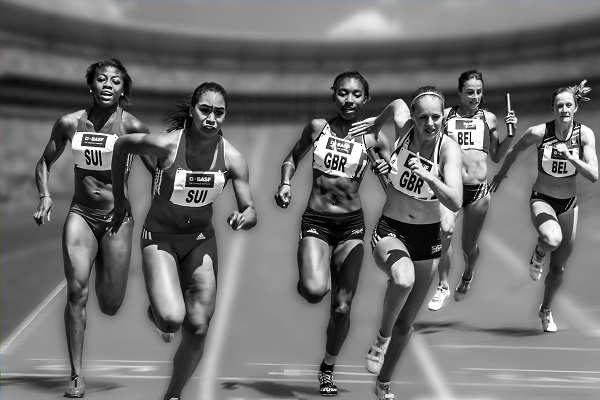Sports Psychology

What is Sports Psychology ?
This topic deals with the study of the modern day sports and importance of physical education. Now-a-days sports has a vast field of opportunities and has become more and more important in day to day life.
Every field of sports has become tough and competitive. To enhance the performance of an athlete every little aspect of sport is being studied from a scientific viewpoint.
In this regard psychology of the athletes has an important role to play in their performance. It develops the neurological, mental and social aspect of an athlete.
Definition
Sports Psychology is the study of how, psychology influences a sport, athlete’s performance, exercise, physical activity. Some psychologists work along with professional athletes and coaches to improve their performance and increase their motivation.
Basic Needs for Studying The Athlete’s Mental Alignment:
Helpful for physical education
It is required in teaching content.
It is also required in teaching process.
In learning to deal with situations.
Psychological Factor for Performance:
Awareness:
Awareness is the recognition of the need to do something to gain control over future goals and targets. Moreover it is also the first step to gaining control of any unexpected situation.
The athlete must determine if any of the different aspects of his or her mental, emotional or physical state needs adjustment in order to give their best performance for success. Self assessment of one’s various aspects of life helps to create awareness within the athlete and gives the person a foundation in which he or she can begin to improve or optimize their performance.
Concentration:


Concentration and attention are very important aspects of an athlete’s performance.
There are 2 general ways to improve concentration, and that is through either a Process Focus or an Outcome Focus.
A Process Focus involves directing one’s attention to the act of completing a motion in the respective sport.
An Outcome Focus involves in directing one’s attention to an end product. Both methods can be beneficial or dangerous based on their situation of use. It is important to use both techniques and the key is the timing in which they are implemented.
Anxiety:

Anxiety is defined as an unpleasant and unsteady emotional state of the mind. This emotion can be divided into 2 basic sections:
- State Anxiety- Is specific to a certain situation or environment.
- Trait Anxiety- Is specific to a certain person or a team
Think of State Anxiety as something that happens periodically and trait anxiety as something that always happens, no matter what the environment is. Too much of either can negatively affect the performance of an athlete or a team.
Confidence:
Confidence is a result of how one thinks, what one focuses on and how one reacts to the event’s in one’s life. Most of all, a decision to not be bound by the fear of failure will allow an athlete to put his total effort into the present task. Failure has the natural consequences leading to inappropriate judgement and complaints and questioning one’s ability(worthiness). Successful athletes have a tendency to ignore the natural consequences of failure and focus on his/her constant improvement and to accomplish a specific goal at the present moment.

Motivation :
Motivation is the key psychological factor for sports performance. Motivation influences the amount of effort expended, the ability to bounce back after a setback, how long an athlete will ensure long and or difficult training periods and the actual competition results. But motivation is one such factor over which the athlete has the most control.
Athletic Stress

Stress-Sources for An Athlete
- Need to please parents, coaches, teammates, fans
- Need to create or maintain self-image
- Need to adhere to strict schedules
- Need to follow a rigorous diet, exercise, and sleep regimen
- Insufficient time for relaxation and rest
Athletic Stress....
A certain amount of stress is inherent in competitive sports, but managing athletic stress is necessary to maintain physical and mental fitness
Cognitive:-
Difficulty in concentrating, difficulty in making decisions, Worrying and negative thoughts.
Emotional:-
Anger or irritability, Anxiety, Sadness or depression, decreased motivation, low self esteem or self criticism.
Physical:-
Muscle tension, exhaustion and fatigue, headaches and organ issues.
Behavioural:-
Social withdrawal, decline in performance, excessive sleep and appetite, engagement in unhealthy practices.
Stress can lead to......
Physical symptoms such as
- Increased heart rate
- Elevated blood sugar
- Excessive sweating and exhaustion
- Muscle tension or pain
Behavioral symptoms such as
- Irrational behavior
- Incoherent speech
- Panic attack
- Nervous habits or tics
Stress Management

Athletic stress should be recognized and treated in time to alleviate it. Athletic stress can result in anxiety or depression, panic attacks, eating disorders or substance abuse. Athletic coaches and psychologists often work together to create stress-management programs. Various techniques used in managing athletic stress include:
- Relaxation and deep breathing sessions
- Regular Counseling
- Recreation
- Realistic short term goal setting
- Yoga and meditation
- Muscle relaxation
You may visit the website given below for a real life Hero, Simone Biles who has shared her experience with mental health issues.



Comments (1)
noodle magaizne - January 6, 2025
Noodlemagazine I appreciate you sharing this blog post. Thanks Again. Cool.